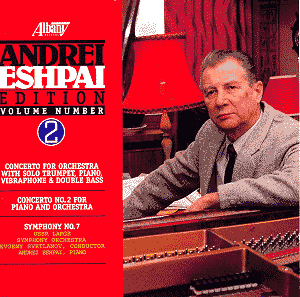Andrei Eshpai was born on 15 May 1925 in the
city of Kozmodemynsk on the Volga River in the autonomous republic
of Mari of the RSFSR. His father, Yakov Andreevich Eshpai (1890-1963),
was one of Mari's first professional composers. He was also a
choral conductor, folklorist and educator. He composed the first
Mari instrumental works, collected the folksongs of his region,
and for many years was on the faculty of the Mari National Institute
of Language, Literature and History in Ioshkar-Ola (the capital
of the Mari Republic). With this background it is no wonder that
Eshpai went on after studies with Miaskovsky not just to eminence
but to a position of some affection among listeners in the know.
The phantasmagorical Concerto for Orchestra
is at first a sort of ‘Rhapsody in glowing Red’ (rather than
Blue). Hyper-active textures, febrile activity and blazing jazziness
are its hallmarks. The effect can be summarised as Shostakovich's
Preludes and Second Piano Concerto meet William Schuman meets
Rite of Spring meets Bernstein's Candide. The jazziness
suggests acquaintance with the works of Nikolai Kapustin whose
piano concertos we also need to hear. After hectic rushing action
(which is to return in the last five minutes of this succinct
work) you can relax into a great lush bed of healing string sound
at 3.45. It is here that the jazz-muted trumpet sings a querulous
melody somewhere between Nights in the Gardens of Spain
and Borodin's steppes. The double bass sidles unapologetically
onto the scene and yearns along to the same theme. It is much
to Rodion Azarhin's credit that he makes such a touching contribution
(7.37). The wide-striding brass, strings and percussion and blaring
triumph of the finale is gloriously enjoyable. It is like a cross
between Rachmaninov's Symphonic Dances and Gershwin.
The Second Piano Concerto is in three
short movements is aggressive and full of impact and fire chased
rhythmic action. The level of dissonance is high in comparison
to the Concerto for Orchestra. While the symphony and the Concerto
for Orchestra are in stereo this is in mono - vivid and gaudily
lit.
The Seventh Symphony (I believe that it
is the latest) emerges from a sour malcontented dissonance soon
embracing a hushed lyricism warmed by consolation. There are no
popular culture invasions here unlike The Circle. The Symphony
is a serious-minded and extremely concentrated piece. At 8.30
meditation is cast aside and a vexed irritable and gritty velocity
bubbles to the surface. At 13.00 the music settles back into quietude
with vibraphone and xylophone colouring the scenery. A heroic
determination empowers the swaying power of the craggy brass line
running strongly from 18.10 onwards. I find it intriguing that
the contemporaneous concertos for Flute and Double Bass are much
more dissonant than this work. The Symphony is much closer to
Rubbra and Boiko than to the wilder shores of Krennikhov or Vainberg.
This is a very fine work indeed being wonderfully sustained across
33 minutes. Highly recommended. The conductor as for the other
two works on this disc is Yevgeny Svetlanov. While the other two
works come from LP-era recordings this one is quite new.
If you like driven and neon dramatic music this
is for you. Into the bargain you get recordings of two world premiere
live events.
Rob Barnett
